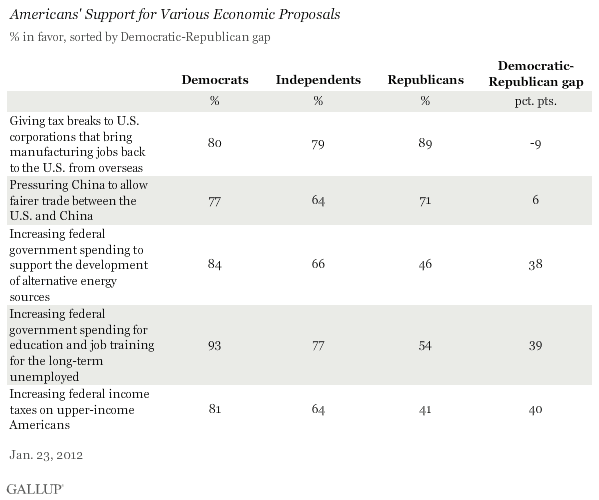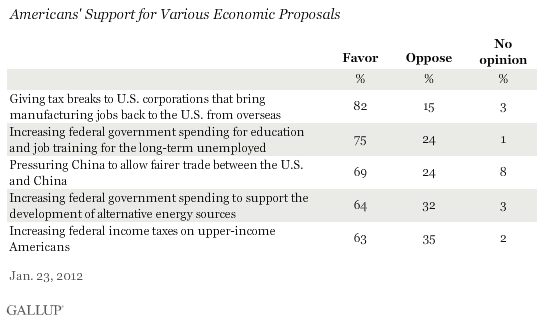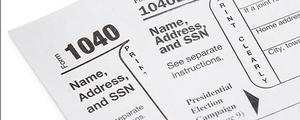WASHINGTON, D.C. -- Among five specific economic proposals, both Republicans and Democrats are in favor of giving tax breaks to corporations that bring manufacturing jobs back from overseas and pressuring China for fairer trade. They are sharply divided about increasing federal income taxes on upper-income Americans, increasing federal spending to help the long-term unemployed find jobs, and increasing federal spending on the development of alternative energy sources. The majority of independents favor all five proposals.

The findings are from a Gallup poll conducted Jan. 23, 2012, to gauge support for specific economic proposals President Obama was expected to raise during his State of the Union address. Despite Americans' dissatisfaction with the size and power of the federal government, they tend to favor specific proposals on how the government could accomplish high-priority goals.
In this case, large majorities of Democrats and independents -- and at least 4 in 10 Republicans -- favor each of the proposals Gallup asked about, pushing national support for each of the five well above the majority level. Overall support is highest for tax incentives to encourage corporations to bring back manufacturing jobs and for increasing federal spending to help the unemployed find jobs.

Americans' views of these economic proposals can be partially explained by their specific economic concerns. The two most popular proposals -- giving tax breaks to companies that bring manufacturing jobs back from overseas, and increasing government spending for education and job training for the long-term unemployed -- directly address what Americans clearly perceive as one of the most important problems facing the country -- jobs and unemployment.
With Americans less concerned about trade, energy, and taxes, it makes sense that the other three proposals -- regarding fair trade with China, the development of alternative energy, and increased taxes on high-income Americans -- are less popular.
Implications
Politically, the challenge for President Barack Obama and members of Congress is balancing Americans' concerns about the role and size of government with their concerns about jobs. These Gallup data make it clear that Americans are more likely to favor federal government action that addresses their top economic concern, jobs and unemployment. Proposals on less top-of-mind concerns are not quite as popular. Still, a majority favors each of these specific proposals Gallup asked about, perhaps because respondents aren't given a trade-off, such as the specific price tag.
It is also worth noting that despite the large Democratic-Republican divide on increasing taxes on upper-income Americans, federal funding for the development of alternative sources of energy, and education and job training for the long-term unemployed, a majority of independents favor each of these proposals. Further, lawmakers should expect widespread support for legislation that gives tax breaks to corporations that bring back manufacturing jobs from overseas and efforts to pressure China for fairer trade.
Survey Methods
Results are based on telephone interviews conducted Jan. 23, 2012, on the Gallup Daily tracking survey, with a random sample of 1,008 adults, aged 18 and older, living in all 50 U.S. states and the District of Columbia.
For results based on the total sample of national adults, one can say with 95% confidence that the maximum margin of sampling error is ±4 percentage points.
Interviews are conducted with respondents on landline telephones and cellular phones, with interviews conducted in Spanish for respondents who are primarily Spanish-speaking. Each sample includes a minimum quota of 400 cell phone respondents and 600 landline respondents per 1,000 national adults, with additional minimum quotas among landline respondents by region. Landline telephone numbers are chosen at random among listed telephone numbers. Cell phone numbers are selected using random-digit-dial methods. Landline respondents are chosen at random within each household on the basis of which member had the most recent birthday.
Samples are weighted by gender, age, race, Hispanic ethnicity, education, region, adults in the household, and phone status (cell phone only/landline only/both, cell phone mostly, and having an unlisted landline number). Demographic weighting targets are based on the March 2011 Current Population Survey figures for the aged 18 and older non-institutionalized population living in U.S. telephone households. All reported margins of sampling error include the computed design effects for weighting and sample design.
In addition to sampling error, question wording and practical difficulties in conducting surveys can introduce error or bias into the findings of public opinion polls.
Polls conducted entirely in one day, such as this one, are subject to additional error or bias not found in polls conducted over several days.
For more details on Gallup's polling methodology, visit www.gallup.com.
